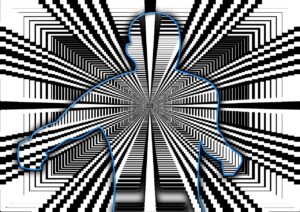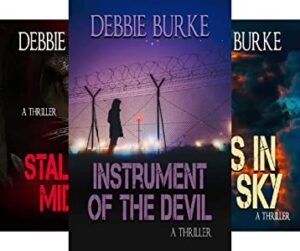
By Debbie Burke
The paranoid hairs on the back of my neck stood up when I read several articles by scientists from MIT, Harvard, and University of Montreal about emerging techniques for manipulating dreams.
Search engines are already scary-smart at reading our minds and predicting our behavior. Type a few letters into the search bar and instantly the rest of the word or phrase appears. Google is like a long-time spouse who finishes sentences for you.
Soon, similar mind reading may be extended into your dreams as you sleep.
Disturbing? Yup.
According to an article by Rob Pegoraro in Forbes.com, as a 2021 Superbowl promotion, Coors Beer offered people free beer in exchange for their participation in a study of “targeted dream incubation,” billed as “The World’s Largest Dream Study.” Subjects were shown Coors’s videos of snowy mountain views and crystal streams several times then fell asleep to the soundtrack of those ads.
https://youtu.be/tU_0jU0mMLw
Upon waking, the subjects reported dreams of waterfalls and being in snow. The most telling—and chilling—reaction of all came from one woman: “I think it was… something to do with… Coors.”
Subliminal advertising in commercials first became a hot topic way back in 1957. Marketer James Vicary claimed sales of popcorn and Coca Cola increased because of messages inserted into ads. The messages supposedly flashed so quickly the eye could not see them. He later admitted his study was a gimmick not supported by evidence.
According to Chron.com, consumer concerns prompted the FCC to issue a statement:
The FCC stated that all broadcasting licensees should not use subliminal advertising techniques because the techniques are deceptive, which runs counter to the purpose of the FCC. The statement is still on the FCC’s website as its stance on subliminal marketing.
Nevertheless, the concept caught on. This article from Business Insider cites examples.

Aboriginal cave painting-Jabiru dreaming
Photo credit: Wikimedia.com CCA SA-4.0
Dream manipulation is nothing new. Ancient peoples as far back as 5000 years and perhaps longer recognized the enormous power of dreams.
Cultures around the world, from Babylonia, Egypt, Greece, Rome, and even remote isolated islands, developed practices to guide dreams toward a specific goal. Some goals included:
- Connection with a deity;
- Seeking solutions to problems;
- Overcoming traumatic events;
- Predicting the future.
To attain these goals, different rituals included:
- Rubbing ashes or paint-like substances on a person’s face;
- Eating raw flesh of a particular animal before sleeping;
- Inflicting pain, e.g. Native American Vision Quests;
- Going to sacred locations to sleep.
Today, many conditions, including anxiety, PTSD, poor school or work performance, eating disorders, etc., are commonly treated by using suggestions during sleep.
Here at TKZ, we frequently talk about how authors can solve story problems by using prompts before they go to sleep. Writers often dream their way through roadblocks.
Watch tracker
Photo credit: Wikimedia.com CC A-2.0
Technology already tracks our physical activity, heart rate, exercise, location, proximity to stores, and far more. Some years ago, while shopping for a new smartphone, I was shocked to find an app that monitored vaginal secretions. Whoa, guys, that is way too intrusive.
When such monitoring goes beyond the physical body and digs into the deepest recesses of the mind, the slope gets downright slippery.
What if a person’s dreams can be manipulated so businesses can profit from them?
With marketers now seeking high-tech ways to manipulate consumers in their sleep, concerned scientists are sounding ethical alarm bells.
In open letter signed by more than 40 scientists in June, 2021, Robert Stickgold, Antonio Zadra, and AJH Haar wrote:
TDI [targeted dream incubation]-advertising is not some fun gimmick, but a slippery slope with real consequences. Planting dreams in people’s minds for the purpose of selling products, not to mention addictive substances, raises important ethical questions. The moral line dividing companies selling relaxing rain soundtracks to help people sleep from those embedding targeted dreams to influence consumer behavior is admittedly unclear at the moment.
Futurism.com says:
…it’s only a matter of time before tech companies that make watches, wearables, apps and other technology that monitor our sleep start to sell that data for profit, or use those tools to hack our dreams while we slumber.
Our dreams might turn into nightmares we can’t wake up from.
This technology opens a vast plot playground for authors of sci-fi, crime, and thriller writers to explore nefarious uses for dream hacking.
TKZers, please name books or films where dream manipulation is used.
How would you incorporate dream hacking into a plot?
Do you give yourself pre-sleep suggestions?
~~~

Debbie Burke’s books won’t hack your dreams but many reviewers say they keep them awake at night. Please check out Tawny Lindholm Thrillers with Passion, for sale at this link.

Whoa, Debbie. That is disturbing. To answer your question, I often think about my plot before falling asleep, especially if I need to work out a problem. But I can’t imagine allowing anyone into my dreams. What’s next? Microchips inserted at birth?
Thanks for sharing your research. I may use it in a future book. 😉
Sue, when you write a book about dream hacking, I’ll be your first reader!
Some people will do anything for free beer. Sigh.
Timely! Freddie Krueger came into my nightmare last night, and forced me to read Middlemarch again.
Is there subliminal **readJim’sbooks** danger? Perhaps. But with **readJim’sbooks** foresight we can fight back.
Jim, why do I suddenly feel an irresistible urge to buy your books?
Wow, Debbie, this is very interesting, and somewhat scary. I’m reassured by the statement the dream psychologist in the video made about the technique being possible in “cooperative” subjects. I don’t plan to become “cooperative” any time soon.
I do give my boys in the basement assignments by thinking about plot problems while I’m drifting off, but I don’t want to give advertisers free entrance to my dreams with techniques they use in their commercials (another reason it’s a good idea to mute the sound during commercials and direct one’s attention elsewhere).
And, I do like your idea about incorporating dream hacking into a plot. I’ll have the boys research that one. Working with fantasy adventures, I can see how such techniques could produce some wonderful havoc.
Full disclosure: This response may contain some suggestive material which could implant itself and germinate in your conscience (the ego) resulting in the irresistible urge to go immediately to Amazon and buy my books.
Steve, I didn’t figure you’d become the Manchurian Candidate. 😉
Dream hacking is a natural for a fantasy plot. Go for it.
The boys in my basement (whom I refer to collectively as “The Guardienne” or “⅁”) never sleep. It is the ⅁ who is the danger, not the ego/intellect/rational mind. Under hypnosis, your intellect falls asleep and the ⅁ takes over, and it has no conscience. Dream pushing is hypnosis!
J, hypnosis is exactly right.
Fascinating and chilling post, Debbie. Lots to think about here. Typically, I don’t remember much of my dreams, save for the rare vivid one. I could see where dream manipulation could give a person that vivid dream experience, with emotional or potentially even behavioral changes later.
The 2010 film “Inception” deals with a corporate espionage team working, heist fashion, to implant information in a CEO’s subconscious, to change his behavior. That’s the one that I was reminded of. Christopher Nolan directed it, and he excels at giving multiple levels to reality. In the case, including ambiguity about what really happened in the film.
Your post has given us lots of food for thought. Have a wonderful week.
Thanks, Dale. I haven’t seen Inception. Sounds intriguing.
I think you’d enjoy it! A fascinating near future heist meets thriller science fiction film. I neglected to mention that the espionage team needs to do all this while in a dream-like state. I blame my failure on lack of sleep–I was up in the wee hours catching the lunar eclipse, which I was able to view in between banks of clouds 🙂
My dreams were always about the next book, not my current one. They usually came when most of the creative energy had been spent, and my brain was eager for all those lovely chemicals from a new project. These days, the ones that aren’t my usual “where the shit am I, and how can I get where I’m going?” maze marathons are just for funzies. I can spend most of my day mulling over the possibilities. All the pleasure of playing with ideas without having to put it on paper. Retirement. Yeah!
One of the things I enjoy about paranormal, psychic, and fantasy novels is the use of dreams and weird dreamscapes as storytelling devices. Archetypes and spot-on imagery can be extremely powerful.
“My brain was eager for all those lovely chemicals from a new project.”
Marilynn, what a great observation. We writers live for that rush.
A very important post, Debbie.
Trigger alert: alcohol is mentioned in this Reply.
Carl Jung said: “In each of us there is an ʘther whom we do not know. He speaks to us in dreams and tells us how differently he sees us from the way we see ourselves…” –from Psychological Reflections
Any tampering with the dream process is thus risky, since it may interfere with important messages from the ʘther. Worse, the latter is not only the source of dreams, it is also the addictive part of the brain, the little voice that whispers to alcoholics day and night: “Golly, a drink would be really great right now! Why don’t we go sip some nice Guzzler’s Gin?”
I’ll bet Coors was cautious enough to screen alcoholics from their experiments. The liability would be huge. And we can’t say that their experiment was safe for people who aren’t alcoholics. What if it converted them? On the other hand, some form of dream pushing may be of therapeutic value in treating alcoholism.
Hug your ʘther* today! (But let it know you are in charge.)
* AKA The Guardienne or ⅁
J, the possible ramifications and long-term effects are chilling. Thanks for adding your learned perspective.
Scary…thanks, Debbie. Now I know what I’ll be dreaming about tonight. If I see any of you in that dream, I’ll know it’s really a thing.
I recommend “Inception” and “The Manchurian Candidate”.
Pre-sleep suggestion? Deb, go to sleep. Please? 🙂
I’d like to hack my German Shepherd’s dreams to discover why she barks, growls, and moves her feet like she’s running or digging in her sleep. It’s pretty funny to watch. 🙂
Deb, hacking dog dreams would be incredibly fun as well as interesting. We always figured our German Shorthair was chasing rabbits.
Yep! Or squirrels around here…
My golden Molly LOVED a summer game we had. I’d go out every evening and use a small rake like a lacrosse stick to throw fallen tiny apples into the woods. She’d chase them down, and, when they landed under a shrub, she’d stick her nose in, and her tail would circle like a helicopter blade. That was the only time she’d get that excited. If her tail started going in circles while she was sleeping, I always knew exactly what she was dreaming about.
Pretty cool stuff. You have the Sci-Fi person in me thinking of a story.
I wear a Fitbit to monitor my steps, heart rate and sleep. The other day, it shocked me to learn that Google now owns that company. I was wondering if someday Apple, Amazon, and Google will own everything we buy? Now you have me thinking that a major corporate company will attempt to own a piece of me.
Maybe this is the start to copyrighting our dreams? Someone tried to copyright DNA, why not dreams? Here’s the biggie – What if you had to pay to sleep in the future – to go deep into REM? Lots of what if’s 🙂 Like going crazy without proper REM sleep?
Ben, glad to have sparked your sci-fi imagination. Great concepts.
As far as corporations owning a piece of us, unfortunately I think that train already left the station.
Very interesting post, Debbie! Like others here, I often go to sleep mulling over a plot problem and wake up the next morning with the answer. Since the girls in the attic never rest, I figure it’s from them working all night. 🙂
Patricia, ya gotta love the hard work the subconscious performs and you don’t have to pay overtime.
Wow, Debbie. Dream hacking! What a scary thought. I don’t see any scenario where I could use this in one of my books, but maybe I’ll dream one up. 🙂
We sometimes turn on an audio when we’re going to sleep. The Woman in White and Pride and Prejudice are favorites. I have yet to name a character Darcy or Bingley, but you never know.
Wishing you sweet dreams that don’t get hacked, Kay.
Dreams are fascinating. After my therapy sessions to recover from seven years of domestic violence, I understand all too well how dreams can affect us. My therapist taught me how to manipulate my dreams to stop the recurring nightmares. I didn’t believe it would work, but it did. To think about someone else manipulating my dreams for their advantage is literally a nightmare. Shudder.
I’ve never had a dream that related to writing as others have mentioned. However, I have had numerous premonition dreams. So many my family prefers I not share. Guess I can’t blame them. Now some of those have found their way into my supernatural thrillers. 😀
Cecilia, thanks for bringing up the positive ways dream manipulation can be used. Glad it helped you.
I’ve never had premonition dreams–at least ones that came true. But what a good concept for supernatural thrillers.
Great topic! One of my favorite novels is The Lathe of Heaven by Ursula K. Le Guin. The MC has dreams, and when he wakes, the world has changed to match them. He sees a therapist who uses hypnosis to force the world in the direction the therapist wants it to go. But with each change, there are unintended consequences. It’s a powerful statement about being careful what you wish for, and how little humans understand the workings of the universe.
Thanks for the recommendation, Kathy. Sounds like a classic.